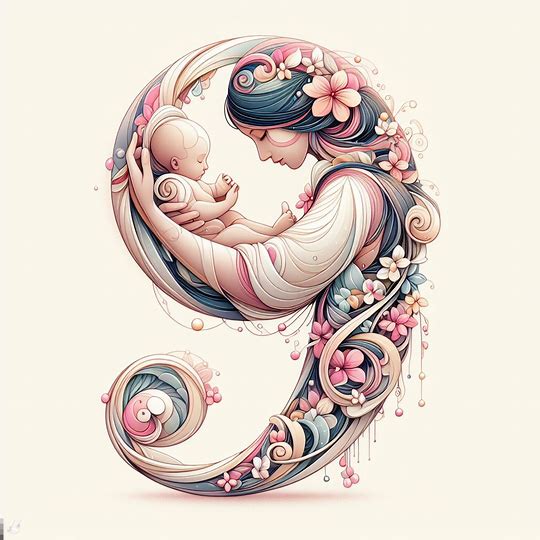The number 9 holds a special meaning in Scripture, often representing completeness, divine perfection, and finality.
In this article, we explore key biblical references and instances where this spiritual number appears, uncovering its profound significance.
Key Takeaways
- The number 9 symbolizes completeness, finality, and divine perfection in the Bible.
- Key biblical associations include the 9 fruits of the Spirit, the 9 gifts of the Spirit, 9 months until the great Flood receded, and Jesus dying at the 9th hour to complete his sacrifice.
- In numerology, 9 is linked to compassion, creativity, innovation, endings preceding enlightened new cycles, and a time of spiritual growth for individuals.
- The Enneagram personality system uses the symbolism of 9 personality types coming together in inner unity. This maps to 9’s representation of internal/external wholeness.
The Symbolism Behind Number 9
The number 9 also holds significant symbolism in various cultures and traditions.
In ancient Egypt and Greece, for example, it represented completeness and perfection.
In Chinese culture, 9 is considered a lucky number because its pronunciation sounds similar to the word for “long-lasting”.
In the Bible, 9 is often associated with finality or judgment. The Flood lasted for 40 days and 40 nights, but it was not until the ninth month that the waters receded and judgment was finalized. Additionally, Jesus died on the ninth hour of the day, signifying the completion of his sacrifice for humanity.
The number 9 also holds a special place in the world of mathematics and science. It is the highest single-digit number and the square of 3, which represents divine perfection in many spiritual beliefs. 9 is also a Fibonacci number, meaning it appears frequently in nature and patterns.
The Enneagram’s Number 9 Symbolism
The Enneagram is a system of nine interconnected personality types shown in a circular diagram. This ancient typology was developed for spiritual growth and self-understanding.
In the Enneagram, each number from 1-9 represents a different personality orientation rooted in core beliefs, motivations, and patterns. Number 9 specifically correlates to the “Peacemaker” disposition.

Peacemakers express the receptive, agreeable, and complacent qualities embodied in the symbolic meaning of the numeral itself. Like the biblical nine signaling the finish of discord and strife, Peacemakers focus on alleviating tension and reinstating harmony.
Hence the Enneagram’s designation reveals the cross-cultural resonance nine has with reconciliation and conflict mediation. As the Peacemaker lives out the spirit of acceptance and understanding, this points back to the biblical nine’s role ushering in eras of restored unity with compassion.
Ultimately, the Enneagram reinforces number 9’s significance as representing the arrival of serene wholeness after brokenness. From Scripture to symbolism, we see how this numeral spiritually marks the mending of breaches through peaceful surrender to higher reconciliation.
Biblical References to the Number 9
The number 9 makes numerous appearances throughout Scripture, carrying symbolic spiritual significance in various narratives, prophecies, listings, timelines, and sacred architectural dimensions.
The Number of Spiritual Fruits and Gifts
The most overt biblical meanings of the number 9 stem from Epistles which delineates spiritual qualities in groups of nine. For instance, the “fruits of the Spirit” that reflect a Christ-like life:
“The fruit of the Spirit is love, joy, peace, patience, kindness, goodness, faithfulness, gentleness and self-control.” (Galatians 5:22)
Similarly, Paul outlines nine gifts of the Holy Spirit for ministering to others:
“To one there is given through the Spirit the message of wisdom, to another the message of knowledge by means of the same Spirit, to another faith by the same Spirit, to another gifts of healing by that one Spirit…prophecy…distinguishing between spirits…speaking in different kinds of tongues, and to still another the interpretation of tongues.” (1 Corinthians 12:8-10)
The number nine here ties directly into biblical numerology – namely, three as the number of divine completeness (Father, Son, and Spirit) multiplied threefold. This makes it easy to see 9 as the number of Godly fruits/gifts multiplied to perfection.
Beyond these listings, the nine Beatitudes spoken by Jesus in the Sermon on the Mount (Matthew 5:3-12) also hold great spiritual significance. These Beatitudes include blessings for the poor in spirit, those who mourn, the meek, those who hunger and thirst for righteousness, the merciful, the pure in heart, the peacemakers, those who are persecuted for righteousness’ sake, and those who are reviled and persecuted for Christ’s sake.
Periods of Judgment and Fulfillment
While the “fruits” and “gifts” carry positive connotations, the Bible also applies the number 9 in contexts of finality and judgment.
The flood in Noah’s time lasted for 40 days and 9 months (Genesis 7:24); there were nine plagues sent upon Egypt before Pharaoh finally released the Israelites (Exodus 7-11); and Jesus took nine disciples with him to the Mount of Transfiguration (Matthew 17:1).
The New Testament also presents Jesus deliberately dying at the 9th hour (3 PM) once his redemptive work was complete. This ties 9 to the climax of his sacrifice and life mission.

Preparing for Revival and Rebirth
Despite associations with endings, 9 often signals the closure of one season in preparation for the next. We see this on the Mount of Transfiguration scene, where Jesus took 9 apostles as witnesses before beginning his final trek to the cross (Matthew 17:1). The 9 became eyewitnesses to his impending fulfillment of salvation.
This concept parallels the delivery of babies after 9 months to begin new life. Biblically, we see how God used preceding periods of judgment or waiting to introduce promises or revivals precisely aligned to the number 9 and its connotations.
Number 9 in Numerology
In numerology, the number 9 carries profound spiritual symbolism and meaning. It is considered one of the most influential numbers due to the following attributes:
Representation of Completion and Wholeness
It is often referred to as the “number of completion,” as it represents the end of a cycle and the beginning of a new one. This number is believed to possess a great deal of energy and is associated with creativity, intuition, and humanitarianism.
Ties to Creativity and Innovation
Those who are influenced by the number 9 are believed to have strong leadership qualities, a deep sense of compassion, and a desire to make a positive impact on the world.
They are often highly creative individuals who possess a strong sense of purpose and can make great strides in art, music, and other creative endeavors.
Time of spiritual growth and transformation
When the number 9 is present in a numerology chart, it is believed to represent a time of spiritual growth and transformation.
It is a time when one may be called to let go of the past and embrace a new beginning. This number is often associated with sacrifice and letting go of material possessions in order to pursue a more spiritual path.
Representation of feminine energy
Additionally, in numerology, the number 9 is seen as a representation of the divine feminine energy, the mother archetype, and the nurturing principle. It is a symbol of completion and wholeness, representing the unity of all things.
Overall, the number 9 in numerology is a powerful and transformative symbol that represents the completion of one cycle and the beginning of a new one.
It is a number of great spiritual significance and is associated with creativity, intuition, and compassion. Those who are influenced by this number are believed to have a strong sense of purpose and the ability to make a positive impact on the world.

The End Signals the Beginning
In both biblical and numerological contexts, we see 9 carry signature themes of wholeness, wisdom, and human betterment with compassionate grace. While it deals with correction and endings, it follows with revival and renewal, often through divine spirit.
This explains why the number holds such sacred meaning in Christianity, with 9 choirs of angels singing praises to the Triune Godhead. Ultimately, whether considering the 9 Beatitudes of peace or fruits of patience, this spiritual number beckons us into revival and renewal.
The deeper we study the symbolic number 9 in the Bible and beyond, the more its significance comes into focus. It shouts, “Get ready for revelation and days of divine visitation!”
We would do well to attune ourselves to what the Lord wants to close and open in each of our lives when we see this number appear repeatedly.
Guide to the Biblical Meaning of Number 9
| Key Concept | Description |
|---|---|
| Completion and Finality | Signals a finished cycle or period of God’s work |
| Divine Perfection | As 3 x 3, it ties directly to God’s trinitarian wholeness |
| Spiritual Gifts and Fruits | Listings of 9 gifts/fruits represent fullness of spirit |
| Judging and preparing | 9-period judgments precede coming promises or moves |
| Precedes New Birth | While an ending number, often ushers in fresh starts |
| Universal Compassion | Numerology links it to humanitarianism and tolerance |
Conclusion
In conclusion, the biblical meaning of the number 9 holds significant spiritual significance in our lives. As we have explored throughout this article, the number 9 represents completion, fulfillment, and divine judgment. It is a sacred number that has been referenced numerous times in the Bible, from the creation story to the Ten Commandments and beyond.
As Christians, the number 9 reminds us of the power of faith and prayer in our spiritual journey. It encourages us to seek divine guidance and to trust in God’s plan for our lives, even when we are faced with challenges and uncertainty.
As we continue on our spiritual journey, let us hold on to the significance of this sacred number and trust in the plan that God has for each and every one of us.

FAQs
Q: Why is 9 considered a holy number in the Bible?
The number 9 is considered holy due to its association with the fruits of the Holy Spirit, the gifts of the Holy Spirit, divine judgment, and spiritual completion or fulfillment. It recurs throughout key moments in biblical history and prophecy.
Q: What is the spiritual meaning of 9 in numerology?
In numerology, the number 9 represents completion, humanitarianism, creativity, and intuition. It is seen as highly spiritual and is associated with an ending that precedes a new beginning. People influenced by 9 are compassionate leaders who aspire to make the world better.
Q: What is the Enneagram and its link to the number 9?
The Enneagram is a nine-pointed diagram used to represent nine personality types. The central point of the Enneagram, associated with the number 9, represents full integration of these types and spiritual wholeness.
Q: Is the number 9 lucky in the Bible?
More than being lucky, 9 has spiritual potency in the Bible. It is considered holy and sacred, tied to divine judgment and the fruits of a righteous, spirit-filled life. So it is more meaningful than simply luck.
Q: What does the number 9 symbolize in the story of Jesus?
Jesus died at the 9th hour of the day (3 PM), symbolizing the completion of his sacrifice and life’s mission for humanity’s sake. So 9 is associated with the culmination of his earthly works and role as mankind’s savior.
Q: What does the number 9 mean in Hebrew?
In Hebrew, the number 9 carries deep symbolic meaning tied to concepts like finality, fulfillment, and divine judgment.
The root word for 9 implies end or completion, which aligns with biblical themes of closure and new beginnings. Additionally, the Hebrew word for “fruit” shares a gematria value of 9, connecting it to spiritual fruits and gifts.
More broadly, 9 often represents the fullness of a cycle giving way to the next epoch. And unlike other single digit numbers, 9 unusually does not correlate to one of God’s Hebrew names, giving it a rare potency.
The 9th month of the Jewish calendar culminates these connotations as a period of judgment.
So while composed of only a single stroke in Hebrew, the number 9 reveals multilayered spiritual significance tied to completion of one season ushering in renewal.






